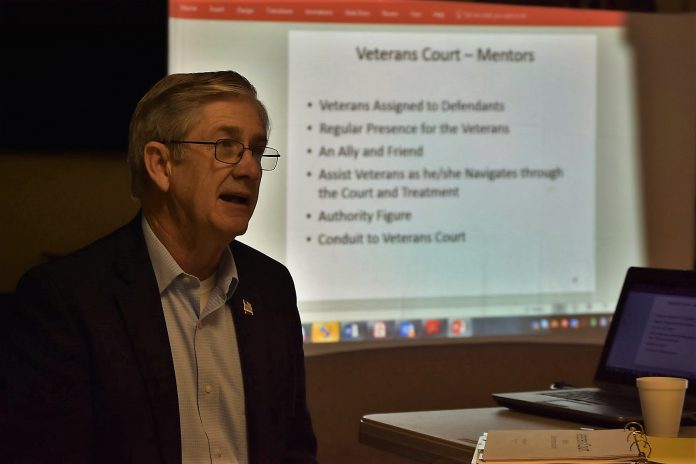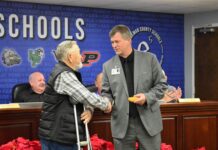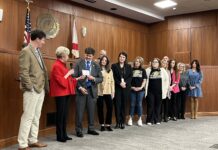Army veteran and longtime mentor, Col. Ray Zimmerman, explains Madison County’s Veterans Treatment Court and the role of mentors there to Cullman area veterans this week. (W.C. Mann for The Cullman Tribune)
CULLMAN, Ala. – Cullman County judges Rusty Turner and Gregory Nicholas this week took the next step toward the creation of a Veterans Treatment Court, holding a mentor recruiting and information session at Veterans of Foreign Wars Post 2214. They welcomed retired Army Col. Ray Zimmerman, who has worked for several years with the successful Veterans Treatment Court program in Madison County, to come and describe that program, which serves as a model for the development of Cullman’s, and talk about the crucial role played by mentors.
The Veterans Treatment Court, scheduled to hold its first session on April 25, will offer veterans who have been arrested for nonviolent offenses an alternative to jail time and a criminal record. It will not excuse any crime committee, in fact, the veteran must plead guilty to the charge, but will work to help that person overcome whatever life situation brought him or her to the point of committing a crime. Participants undergo three to six months of intensive supervision including regular drug screens and meetings with court officials, followed by periods of incrementally stepping down the requirements until the veteran is ready to graduate. Participants typically stay in the program from 12-18 months.
Madison County’s Veterans Treatment Court currently enjoys an approximately 85 percent success rate.
Mentors a key to program success
A veterans court will partner with local law enforcement, mental health services, veterans’ services agencies and others to bring resources together from a broad range of disciplines to help participants, but the main points of contact between veterans and the program are other veterans who serve as mentors.
Zimmerman told The Tribune, “The mentor is here to provide the opportunities for the mentee to improve his station in life.”
Mentors come to court with participants, help them navigate through the legal and treatment system, and hold them accountable for meeting their program requirements. While they are not to present themselves as counselors, mentors can offer a sympathetic ear for participants who just need to talk through some issues. Maybe the most important resource they offer the participants is their friendship.
Zimmerman told the crowd that the mentor’s best tool: “Just care about your mentee.”
According to Nicholas, “We’re really fortunate, I think, in this county that we do have people in the DA’s office, and the judges, and the law enforcement that are committed to veterans. And this concept is something that we’re all invested in, but it’s really not going to work without the mentors. The mentors really are the heart and soul of this program, because they provide the tools that are necessary to help that individual that has run afoul of the law kind of navigate through the judicial system.
“Now, again, the mentors are very helpful; they’re going to help navigate. They’re not going to be therapists, they’re not going to be lawyers, but they’re still going to be instrumental, really, in helping the veterans court program succeed.”
Volunteers will undergo training led by instructors like Zimmerman from established veterans court programs.
Cullman County is currently seeking only military veterans to serve as mentors, believing that people who understand the military experience and “speak the language” can offer the best help to other veterans.
Turner, who is a Navy veteran himself, will take the lead in Veterans Treatment Court, with Nicholas in a support role.
Turner told The Tribune, “I think it will give people an opportunity to, if they’ve made a bad choice, that they can rectify that bad choice and turn a negative into a positive, and hopefully get their life back on track.
“If it’s something relatively serious, or if it’s just a minor hiccup that can affect their employment and definitely affect their relationship with their family members, if we can help fix that, then I’m all for it.”
Get involved
At the end of the meeting, several people present began filling out mentor applications on the spot, but the judges will take as many qualified applicants as they can get.
If you are a veteran who is interested in helping other veterans by becoming a mentor, contact VFW Post 2214 Commander Will Harris at 256-739-6611 or email twodogwill@hotmail.com. Mentor applications are available from, and completed forms can be dropped off at, the VFW Post, 112 Veterans Dr. SW in Cullman.
Copyright 2019 Humble Roots, LLC. All Rights Reserved.




























